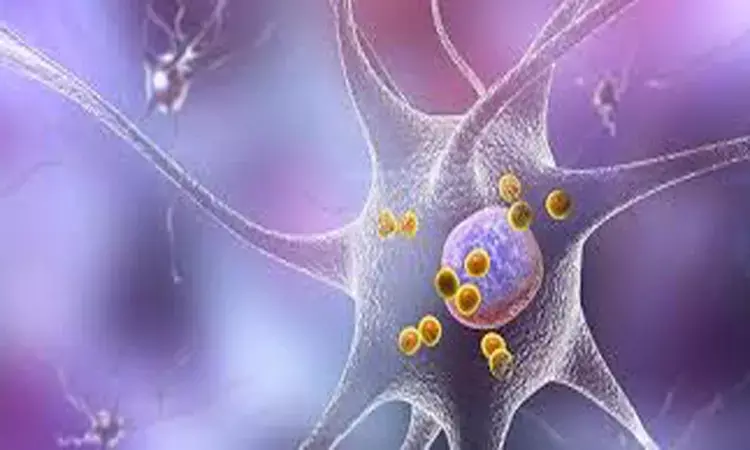- Home
- Medical news & Guidelines
- Anesthesiology
- Cardiology and CTVS
- Critical Care
- Dentistry
- Dermatology
- Diabetes and Endocrinology
- ENT
- Gastroenterology
- Medicine
- Nephrology
- Neurology
- Obstretics-Gynaecology
- Oncology
- Ophthalmology
- Orthopaedics
- Pediatrics-Neonatology
- Psychiatry
- Pulmonology
- Radiology
- Surgery
- Urology
- Laboratory Medicine
- Diet
- Nursing
- Paramedical
- Physiotherapy
- Health news
- Fact Check
- Bone Health Fact Check
- Brain Health Fact Check
- Cancer Related Fact Check
- Child Care Fact Check
- Dental and oral health fact check
- Diabetes and metabolic health fact check
- Diet and Nutrition Fact Check
- Eye and ENT Care Fact Check
- Fitness fact check
- Gut health fact check
- Heart health fact check
- Kidney health fact check
- Medical education fact check
- Men's health fact check
- Respiratory fact check
- Skin and hair care fact check
- Vaccine and Immunization fact check
- Women's health fact check
- AYUSH
- State News
- Andaman and Nicobar Islands
- Andhra Pradesh
- Arunachal Pradesh
- Assam
- Bihar
- Chandigarh
- Chattisgarh
- Dadra and Nagar Haveli
- Daman and Diu
- Delhi
- Goa
- Gujarat
- Haryana
- Himachal Pradesh
- Jammu & Kashmir
- Jharkhand
- Karnataka
- Kerala
- Ladakh
- Lakshadweep
- Madhya Pradesh
- Maharashtra
- Manipur
- Meghalaya
- Mizoram
- Nagaland
- Odisha
- Puducherry
- Punjab
- Rajasthan
- Sikkim
- Tamil Nadu
- Telangana
- Tripura
- Uttar Pradesh
- Uttrakhand
- West Bengal
- Medical Education
- Industry
Autoimmunity plays a role in Parkinson's disease confirms study

LA JOLLA—A new study co-led by scientists at the La Jolla Institute for Immunology (LJI) adds increasing evidence that Parkinson's disease is partly an autoimmune disease. In fact, the researchers report that signs of autoimmunity can appear in Parkinson's disease patients years before their official diagnosis.
The study has been published in the journal Nature Communications.
The research could make it possible to someday detect Parkinson's disease before the onset of debilitating motor symptoms—and potentially intervene with therapies to slow the disease progression.
Scientists have long known that clumps of a damaged protein called alpha-synuclein build up in the dopamine-producing brain cells of patients with Parkinson's disease. These clumps eventually lead to cell death, causing motor symptoms and cognitive decline.
"Once these cells are gone, they're gone. So if you are able to diagnose the disease as early as possible, it could make a huge difference," says LJI research assistant professor Cecilia Lindestam Arlehamn, Ph.D., who served as first author of the new study.
A 2017 study led by Sette and Sulzer was the first to show that alpha-synuclein can act as a beacon for certain T cells, causing them to mistakenly attack brain cells and potentially contribute to the progression of Parkinson's. This was the first direct evidence that autoimmunity could play a role in Parkinson's disease.
The new findings shed light on the timeline of T cell reactivity and disease progression. The researchers looked at blood samples from a large group of Parkinson's disease patients and compared their T cells to a healthy, age-matched control group. They found that the T cells that react to alpha-synuclein are most abundant when patients are first diagnosed with the disease. These T cells tend to disappear as the disease progresses, and few patients still have them ten years after diagnosis.
The researchers also did an in-depth analysis of one Parkinson's disease patient who happened to have blood samples preserved going back long before his diagnosis. This case study showed that the patient had a strong T cell response to alpha-synuclein ten years before he was diagnosed with Parkinson's disease. Again, these T cells faded away in the years following diagnosis.
"This tells us that detection of T cell responses could help in the diagnosis of people at risk or in early stages of disease development, when many of the symptoms have not been detected yet," says Sette. "Importantly, we could dream of a scenario where early interference with T cell responses could prevent the disease from manifesting itself or progressing."
Sulzer added, "One of the most important findings is that the flavor of the T cells changes during the course of the disease, starting with more aggressive cells, moving to less aggressive cells that may inhibit the immune response, and after about 10 years, disappearing altogether. It is almost as if immune responses in Parkinson's disease are like those that occur during seasonal flu, except that the changes take place over ten years instead of a week."
In fact, already therapies exist to treat inflammation from autoreactive T cells, and these TNF therapies are associated with lower incidence of Parkinson's disease. Going forward, the researchers are especially interested in using a tool called a T cell-based assay to monitor patients already at risk for Parkinson's to see if they could benefit from TNF therapies. These patients include people with REM sleep disorders and certain genetic mutations.
The researchers hope to study more Parkinson's patients and follow them over longer time periods to better understand how T cell reactivity changes as the disease progresses.
Hina Zahid Joined Medical Dialogue in 2017 with a passion to work as a Reporter. She coordinates with various national and international journals and association and covers all the stories related to Medical guidelines, Medical Journals, rare medical surgeries as well as all the updates in the medical field. Email: editorial@medicaldialogues.in. Contact no. 011-43720751
Dr Kamal Kant Kohli-MBBS, DTCD- a chest specialist with more than 30 years of practice and a flair for writing clinical articles, Dr Kamal Kant Kohli joined Medical Dialogues as a Chief Editor of Medical News. Besides writing articles, as an editor, he proofreads and verifies all the medical content published on Medical Dialogues including those coming from journals, studies,medical conferences,guidelines etc. Email: drkohli@medicaldialogues.in. Contact no. 011-43720751


